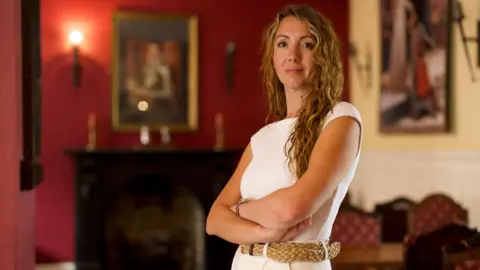 BBC
BBCClosing entire floors of hotel rooms and offering a £500 reward for new staff are just some of the ways hospitality owners in rural areas say they have had to cope with a “recruitment crisis”.
Hotel and restaurant owners said despite things easing in recent months, they still regularly struggled to find enough staff, resulting in reduced opening hours or even the temporary closure of some services.
Alex Barry, 21, who manages the Red Lion pub and hotel in Llangadog, Carmarthenshire, said he sometimes faced working an entire weekend alone, as there were no other staff to help him.
The Welsh government said it was working closely with the industry to help “recruit and retain staff”.
Mr Barry said staff shortages meant he had to take up every role in the hotel at once, from cleaning rooms to checking in guests – and then running the bar.
“It’s so hard to find people,” he said.
“It is unreal at the minute. I put a job post up a couple of weeks ago and it took me two weeks just to find one applicant. I tried advertising on Facebook, I had posters up in the window.
“A couple of years ago I’d have one poster up in the window and about six applicants coming in. It’s so different.”
Mr Barry said the rural location and “unsociable hours” made it trickier for some people but said he “loved coming to work” and meeting the customers.
Samantha Harper, managing director or Red Dragon Pubs, which owns the pub Mr Barry works in, said it felt like the industry had been in “perma-crisis” since Covid.

Ms Harper said at the height of staffing difficulties she’d offered £500 to any member of staff at her seven pubs who could find her a chef.
“We had no staff and we just couldn’t find any,” she said.
“We did [the £500 reward] for a year. During that whole time we only got one person. They only lasted 12 weeks and then they left.”
Ms Harper said her chain had also tried paying for a month-long advert in The Caterer, but had just a single applicant, who would have needed to relocate from Bangladesh.
‘We’ve had shortages of people who want to clean rooms’
“You just have to look down the street here to see how difficult it is,” she said.
“When we bought the Red Lion four years ago, there were four pubs here – now there’s just us, that’s how difficult it is.”
She said they relied on their “fantastic” existing staff, but wished more people would give working in hospitality a chance.
One hotel owner in north Wales – who asked not to be named – said he’d been forced to mothball entire floors of rooms at his hotels, sometimes for weeks, because there were not enough staff to service them.
The owner, who was worried identifying his hotels could harm their business, said he’d also had to cut back the hours their bars and restaurants were open – sometimes serving cold food only.
He described the measures as a “last resort” and said despite a reluctance to admit problems in the industry, he was sure many were affected.

David Chapman, executive director of UK Hospitality Cymru, said having to mothball rooms wasn’t uncommon.
“I know of floors closing, of rooms being closed. We’ve had shortages of people who want to clean rooms. We’ve had shortages of chefs. We’re really adaptive as an industry and people come up with these solutions, but I think that’s levelled off now.”
Mr Chapman said he felt the industry had struggled with “myths” about poor pay and long hours.
“We’ve had to encourage people to join us,” he said.
“Wages have increased by about 50% in the last four years. Obviously, it’s difficult in our industry where you have to serve people on Fridays, Saturdays and Sundays when people want to go out.”
Mr Chapman said many hotels and restaurants he knew of were working hard to make their jobs more flexible and he wanted more people to consider hospitality as a “career” rather than a short-term job.
He said he hoped Wales’ new tourism tax could be an opportunity to invest money back into the industry and he wanted to see revenue going towards bids for big events or concerts to be hosted here.
A spokesperson for the Welsh government said it was working with businesses to help them “access funding for training and to ensure more year-round, permanent, quality jobs”.
“We are investing an additional £78m to provide a sixth successive year of support for retail, leisure and hospitality businesses with their non-domestic rates bills,” they said.



